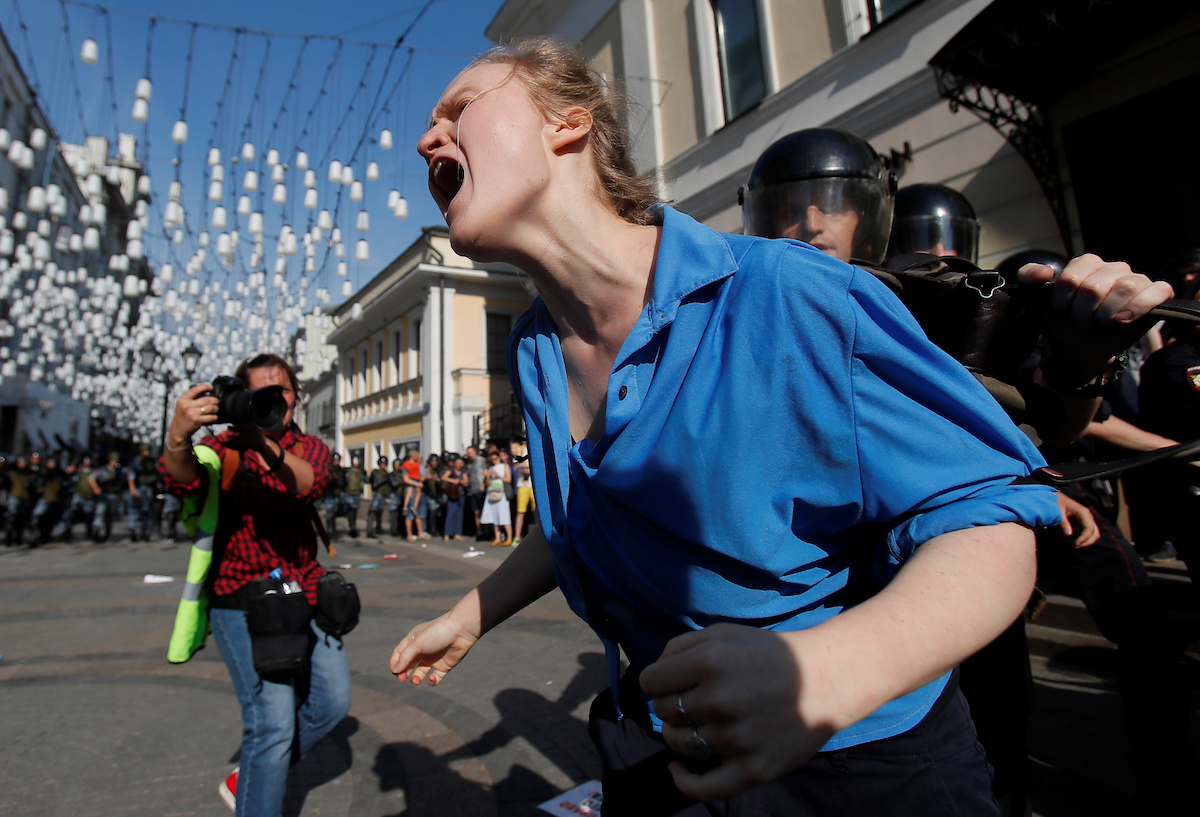Moscow protests: why they’re happening and what they mean
About five thousand people came out today to opposition protests near Moscow City Hall on July 27.
The main demand is to allow a number of independent candidates to register for elections to the Moscow City Duma (city parliament), which will be held on September 8.
There were a few skirmishes with the police.
According to preliminary data, more than 1,000 people have been detained, including several independent candidates. Special Forces and the police beat protesters lying on the ground with batons.

After dispersals, people break up into small groups and are stubbornly moving towards the center.
“We’re like in Harry Potter, good against evil!” said several students to Novaya Gazeta, who also broke through side streets to the city hall building.
• Russia’s main problem is the year 2024 – when Putin by law must resign as president
The police searched the offices of independent TV channel Dozhd and to the studio of leading opposition figure Alexei Navalny. Police said the search was justified given the channel’s broadcast of the unauthorised demonstration.
The BBC drew attention to the programme of transmission of federal channels during these events.
While hundreds of people were detained and beaten, Russian federal television channels broadcast scheduled entertainment programs, entirely avoiding the subject of the unauthorised rally in downtown Moscow and large-scale detentions.
Two weeks of protests
Candidates not from parliamentary parties – largely the opposition – had to collect several thousand signatures of voters. They collected them.
However, opposition politicians say that election commissions purposefully made mistakes while entering voters names and data into the electronic system, so that later, their signatures would be invalidated on this basis.
Opposition politicians took to the streets. Lyubov Sobol, a candidate denied registration, said: “If now these elections are stolen, we will never have any more elections.”
Protest rallies and marches in Moscow began on July 14.
A large demonstration took place on July 20, with about 25,000 people participating.
The leader of the Russian opposition, Alexei Navalny, suggested that if independent candidates were not allowed to participate in the elections, they would meet in protest on July 27 in the very centre of Moscow in front of Moscow City Hall.

Why are the Moscow City Duma elections important?
The Moscow City Duma is not an ordinary legislative body, since according to the Russian constitution, Moscow is a subject of the federation. Its parliament has the right of legislative initiative.
The emergence of independent candidates in the body would first and foremost expand the possibility of holding legal mass protests.
And secondly, the budget of Moscow is about two trillion rubles (more than 30 billion dollars).
Numerous publications in the media indicate that corruption in the Russian capital has reached incredible proportions. Moscow officials openly register property worth tens of millions of dollars for their relatives.
Access by independent candidates to the Moscow budget would open up new opportunities for anti-corruption investigations: one of the main tools of the opposition in its confrontation with the authorities.
The reaction of the authorities
Police resorted to methods of intimidation on the eve of the rally on the 27th.
Leaders of the protest – Alexei Navalny and independent candidates – have been arrested for a period of 8 to 30 days. Searches were conducted in their apartments and offices. Even their elderly relatives have beens searched.

Voter reaction
The intimidation campaigns have proved ineffective.
The first people to express their indignation were people in Russia:
Tennis player Yevgeny Kafelnikov, the former first racket of the world:
“I will go on the 27th not for the sake of the candidates, but for the sake of my people, from whom their future and freedom are taken away in a gangster way.”
Journalist and blogger Yury Dud (5 million Youtube subscribers):
“In a society where the muscles of public debate have atrophied, and there are simply no normal choices, people have to go out.”
Academician, former director of the Institute of Theoretical Physics Vladimir Zakharov:
“I will go to the rally tomorrow in protest of the prevention of a number of independent candidates running for the Moscow Duma. It is an abuse of power, and is subject to criminal prosecution.”



















